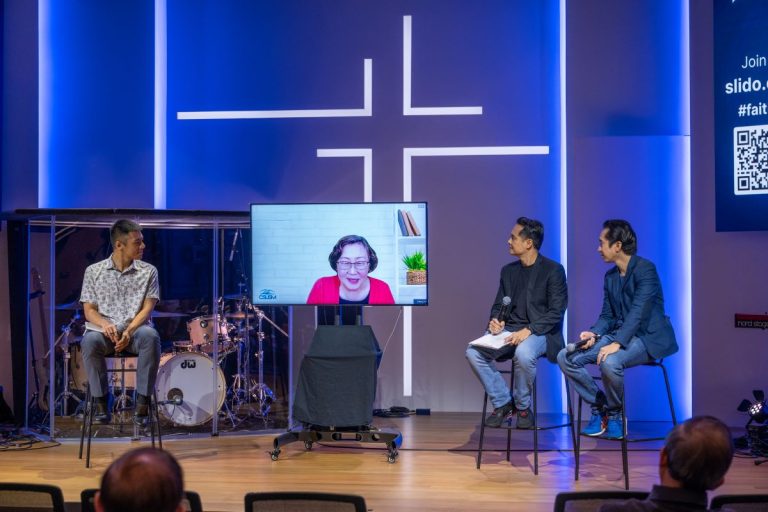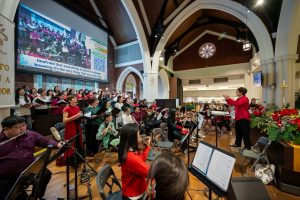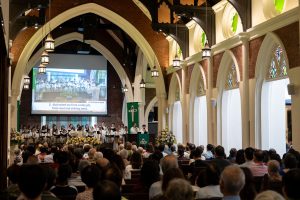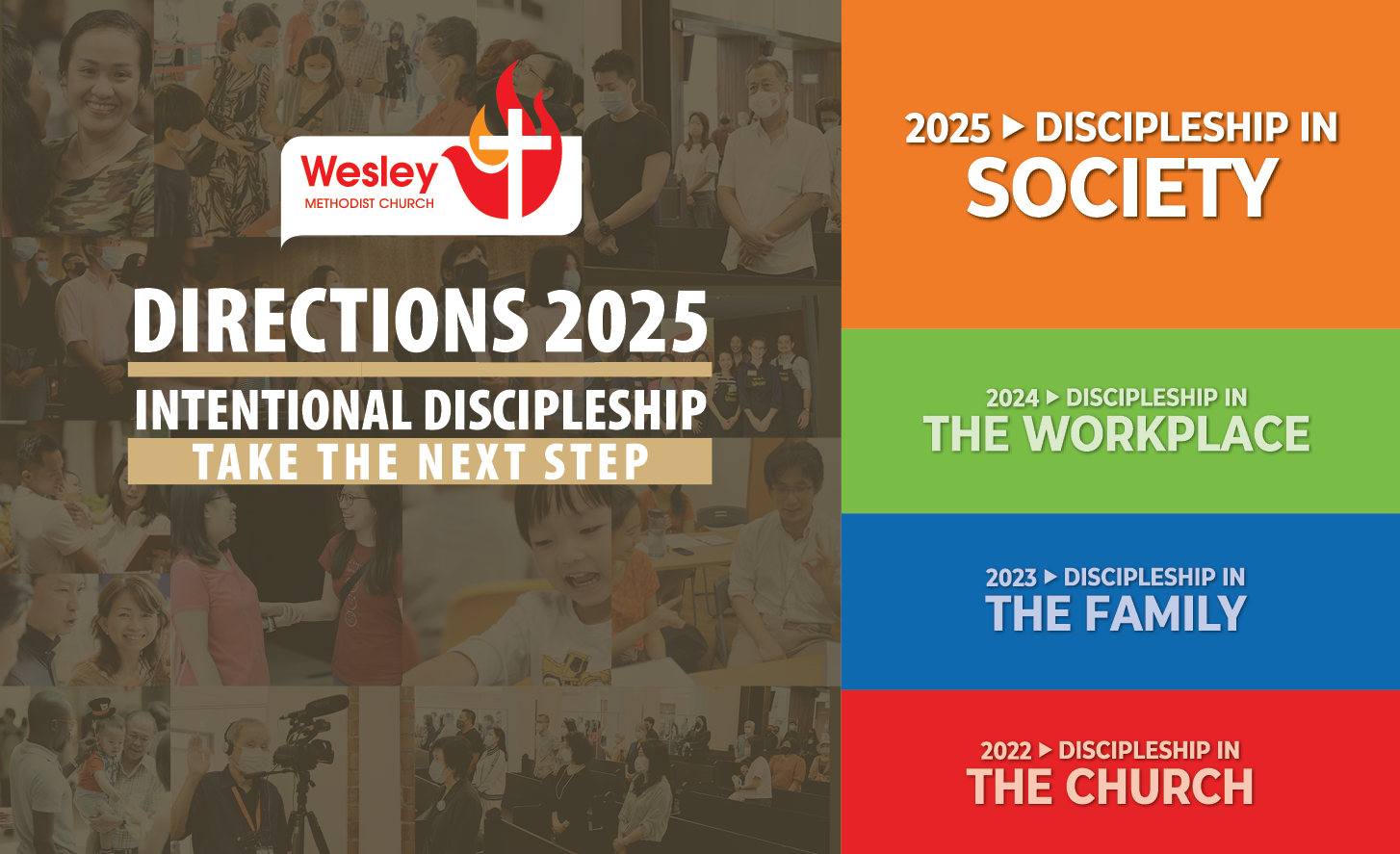Artificial Intelligence (AI) is making itself felt increasingly in this day and age. Like it, hate it, fear it or embrace it, one thing we can’t do is ignore it. Organised by Digital Wesley (DW), a new ministry of Wesley Methodist Church, in partnership with Digital Mission 360 (DM 360), a seminar “Faith & AI: Friends or Foes?” was held on 9 September 2023 for those seeking to understand the implications of Artificial Intelligence (AI) in today’s world. Participants were rewarded with biblical perspectives on the topic and a heart to consider God’s work in the digital space.
THE BIBLE & AI
In the first presentation, Dr Heng Hwee Chuang, Adjunct Lecturer at East Asia School of Theology, dually addressed: “Does God approve of technology and AI?” and “How does the secular world’s philosophical perspective compare with God’s Word in the Bible?”
Artificial Intelligence (AI) leverages on thinking machines that compute and process information, “to mimic problem-solving and decision-making capabilities of the human mind” (IBM). The movie 2001: Space Odyssey shows mankind’s insatiable desire to push the boundaries of human intelligence, albeit with tragic consequences.
The perpetuating evolutionary idea of using technology to go beyond biological limits leads in its extreme to a non-biblical attempt at “transhumanism”. This describes “the idea of humanity attempting to overcome its limitation to arrive at fuller fruition” (Julian Huxley) by using technology e.g. genetic engineering, cryonics, AI and nanotechnology to “improve the human condition and augment capabilities” so that humans will evolve into posthuman beings.
Being Human—What God’s Word Says
What makes us human? From C-3PO and R2-D2 (the non-human robots in Star Wars), to human superheroes in the form of Batman (human and technology), Spiderman (biological transhuman), Ironman (technological transhuman cyborg) and Superman (posthuman transhuman—biological human endowed with supernatural powers), we get a better idea of the potential future scope of transhumanism.

However, God’s Word tells us what a human being is. The human race can never be replaced by superpowered computers and machines. Created in the image of a triune God, humans have both soul and consciousness to govern their actions according to God’s design. People, as spiritual beings, can choose to receive the Saviour’s redemption, be transformed by God’s Holy Spirit, live significantly for their Creator as He intended and be made ready for perfection in heaven. Conversely, AI, being a simulation of the human brain without biological reproductive capability, can only be upgraded through software and have its significance shown only in computerised output.
Embodying God’s Image
We are created with uniquely definitive bodies to show the glory of the invisible God of heaven through Christ-like behaviour and good works. One such example is AI aiding work and leisure, created by people who use their God-given intelligence for the benefit of mankind.

God Is for Technology
It is worth noting that our Creator God intended technology even before the Fall of Adam and Eve. In the Garden of Eden, Adam had to work and keep the earth while ruling over creation with Eve. He had to mine minerals of gold, bdellium and onyx, develop a vocabulary of words and populate the earth with more God-imagers in the likeness of Christ, the Son of God—a command reaffirmed by Jesus in The Great Commission, known also as the Cultural Mandate.
The Bible itself is a piece of technology through which God records all that He wants us to know about Him and His will. Technology weaves its way through the Bible—historically from Eden, God’s Garden creation in Genesis, and prophetically to the New Jerusalem, God’s holy city written about in Revelation. Technologically, God commanded Noah to build an ark, and to Solomon He gave specifications for the Temple’s building.
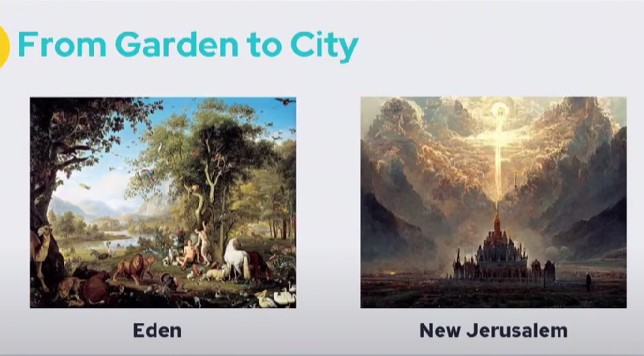
Technology, however, has to be used in obedience to God. The Tower of Babel was built by men who wanted to gather superiorly as one which contradicted God’s command for them to fill the earth. God put an end to their self-centred ambition by causing language confusion among them. Notwithstanding digital devices, the internet and Google, man is first and foremost created by God with a brain to reason, and then with it to develop technology to do good. Whether we use a particular technology or not requires critical evaluation of its purpose and outcome. Will it glorify God and serve His purpose for His people and mankind? Discernment that comes from the Holy Spirit will help us know how we can use AI as a tool to accelerate the work of the Great Commission.
Next, Jason Tamara Widjaja, Director of Artificial Intelligence and Responsible AI Lead at Singapore Technology Centre, addressed several issues regarding the risks and responsibilities associated with AI.
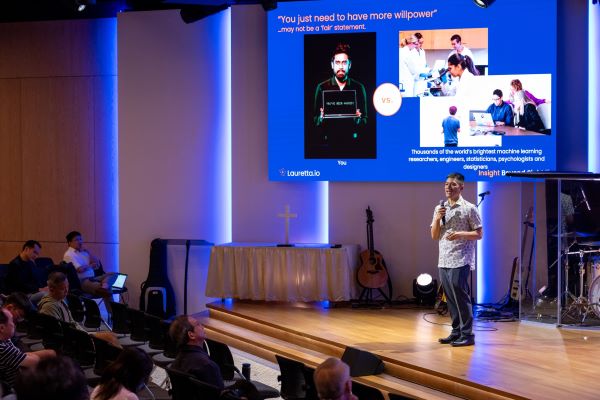
AI is all around us. At work or in church, we benefit from AI—when we get to serve customers better on platforms like Spotify and Netflix with insights and personalisation; operate more efficiently using GPS or Google Search automation and augmentation; and innovate with new capabilities such as ChatGPT or use simulated personalities as news anchors.
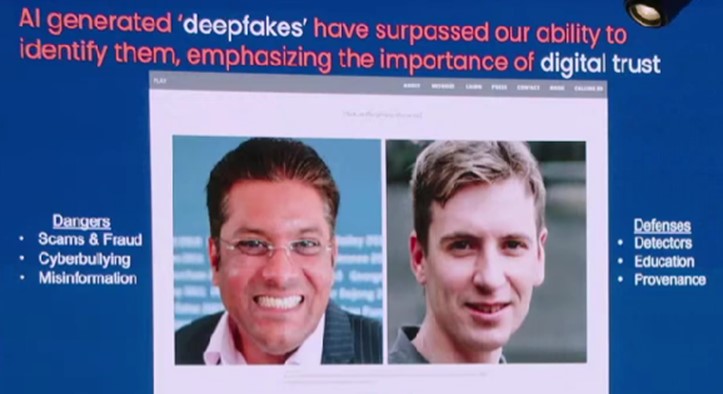
Combating Negative Realities of AI
There is an increasing loss of privacy as “data fuels AI”, and the ethical use of personal data is under scrutiny on many fronts. Addiction to our digital devices also eats away at our time, attention, rest and sleep, affecting our health and causing us to “lose our mental capacity to think deeply”. To redeem the situation, creators can pluck up ethical and moral courage to use the very same tools to optimise technology towards positive ends, like helping people to fact check, improve their mental health, reach their goals, achieve balanced view points, etc.
Being mindful will guard us against distraction by the pervasiveness of an AI-generated attention economy that seeks to grab and sustain our “eyeballs”. Search engines can also narrow our view so that being comfortably ensconced, 90% of our digital world is only 1% reality— “bubble filters and echo chambers” shield us from the realities of a suffering world. Reaching out to serve in missions and social concerns, however, can open our eyes and heart for the lost and least. It is good to remember that it is hard to love our neighbour as ourselves when we don’t know enough about them. (Matthew 22:39)
God-Glorifying Opportunities With AI
While revolutionary technology can yield grander results, every worker is changed over time by the way he works. Farmer A, while using sophisticated machinery that enables him to produce more abundant crops every season, finds his body progressively weakening as compared to Farmer B, who having worked with only basic tools has become stronger and fitter as a result. Here is some food for thought:
- While there is much to be done about using AI ethically, there is a greater need to use it redemptively.
- AI systems are optimising machines, and we all can and should influence what AI is optimising.
- God calls us to tend the garden, so let us do it together as His church with urgency.
PANEL DISCUSSION
Panellists were engaged in a Q&A via the polling platform Slido, and their answers reflected a common theme: Use AI discerningly and impactfully for God’s glory and purpose.
As a faith community carrying out the cultural mandate via missions, what AI tools are effective for ministry? How do we use them?
Dr Heng cautioned that while ChatGPT, Wikipedia, blogs and other digital platforms can provide impressive answers, data analytics and immersive experiences, we need to critically think and not blindly subscribe; by testing them against the source of all information for God’s Truth in the matter. When used to present the Bible virtually, tech tools incorporating virtual reality in video games can also be effective for ministry in a fun way, e.g. on Minecraft.
Regarding translation devices, Jason Widjaja explained how technology can be used to package existing resources to meet different needs, e.g. reshape a Christian message for someone who’s not a Christian or for whom English isn’t a first language.
How can AI help us spread the gospel especially when there’s much deception propagated?
DW Chairman and moderator Charis Lim alluded to recent news that 90 percent of a church service in Germany was AI generated. How then do we discern what’s true and false? Since AI is but a machine not led by the Holy Spirit, Dr Heng reminded the audience that Christian faith, being a spiritual matter, involves the overarching direction of the triune God. Not only should a sermon be delivered coherently with relevant valid applications, its work should be Spirit-led— just as human authors of the 66 Books of the Bible were inspired by the Holy Spirit to write. Unlike data-fed AI, Christian preachers who depend on the Spirit’s leading to speak God’s saving Word have a distinct personalisation and peculiarity. As Charis pointed out: Testing, examining and proving Scripture individually and in community help us discern God’s Truth from that which is artificially generated.
Explaining that AI in itself is neutral, Jason shared three strategies that can help mitigate the problem of evil intent. First, user education and awareness are necessary. Second, efforts are ongoing to develop more sophisticated detectors to identify what’s fake. Third, safeguards are being developed such as watermarking AI-generated content. More currently, through interactions, users can get prompt feedback from others or develop digital solutions in community through events like the Wesley Hackathon coming up on 13 October.
“How deeply should we use technology? Should Christians harness generative AI for good?”
According to Charis, not dismissing AI but redeeming and stewarding it to reflect God’s light is the incumbent way to go. Besides Bible translation and personalised Bible study, AI benefits are plentiful to extend, enlarge and enrich God’s kingdom here on earth— including data analytics to target market segments in social media, and to make possible large scale church growth and missions. Charis reinforced the need to discuss with our curious children any information they access on ChatGPT, so that AI-generated ideas are not received in isolation but critically thought about in community. As long as AI is not used immorally, unethically or un-spiritually, Dr Heng reasons that it should be used as salt and light to counter relativism, do good and impact the marketplace for Christ according to the Great Commission.
While acknowledging that it is challenging to set boundaries, Dr Heng cautioned that parents should seek God’s wisdom and protection for their vulnerable children in a digital world. Teach them to commune with the LORD who created them wonderfully to interact with other human beings, not with human-like amalgamated algorithm machines and software like Siri. Technology is not meant to programme people, who are created by God as unique individuals to live freely for Him.
Is the Human Body Machine-Replaceable?
It isn’t helpful to say AI doesn’t concern us. We should instead embrace the benefits of a digital world while being mindful of what it means to be human and to worship God. Jesus healed by His Word and by His touch. The human body is importantly created with sensory nerves, which no inanimate machine can replace. Which is why disciples gather physically in a community to encourage one another, just as our trinitarian God— Father, Son and Holy Spirit— is in community.
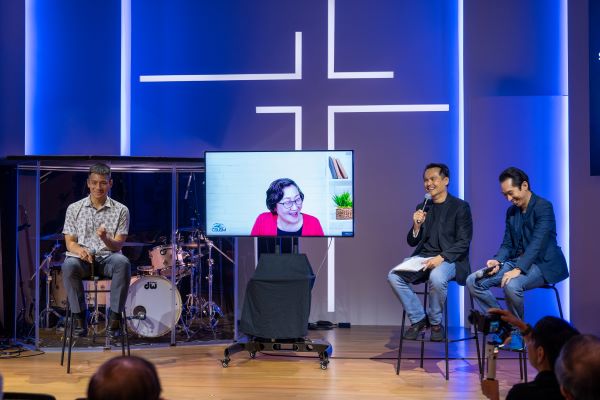
Human Connection and Community
Addressing the fear of people losing their jobs to AI, Jason reasoned that a job is a lot more than a collection of tasks. It’s about relationships and one’s position in a team. Unlike humans, an AI system is not a vessel that God would download His will and speak through. It’s also about responsibility and accountability. It’s not the word processor but its user who is accountable for a job done.
God has not given us a spirit of fear but of power, love and soundness of mind to build His church. A biblical perspective will help us push the boundaries of faith and innovation at our workplaces and in church by redeeming every digital space for the glory of God, to reach people everywhere, even those who cannot step into a church. Adopting a God-fearing approach however is fundamental: Love and obey the LORD your God that you might love your neighbour and bless them as Jesus has commissioned us. Clearly, technology has a place in the scheme of God’s kingdom and His amazing plans for humankind.
Join our first-ever hackathon on 13 October! #HACK2023 is the hackathon for Christians in Singapore to serve God with their gifts and talents by solving missional challenges. Don’t miss this awesome experience. Let’s solve real-world problems together, for Christ and for our communities.

Photos by Marjorie Tan and Gaius Ho
Read also: Making Disciples in the Digital World – birth and mission of Digital Wesley

